 |
 |
 |
 |
 |
 |
|
|
||||
|
FEATURE Book
review New
word of the month
|
Contributors |
|||
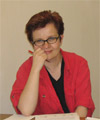 |
Sirkku is currently a senior lecturer in the School of Modern Languages and Translation Studies at the University of Tampere, Finland. She teaches Finnish for future translators and interpreters who study either English, German or Russian. Her second interest in the field of language contacts is teaching Finnish to foreigners. Since 1990, she has taught Finnish as a second language in several educational institutions and on summer courses in Finland. She has also worked as a visiting lecturer of Finnish in North America (University of Washington, Seattle) and Russia (Moscow State University). She has co-authored an exercise book on pronunciation for learners of Finnish. Sirkku has also published several articles on second language learning, language maintenance, and language attitudes. Her research focuses on multilingualism among new linguistic minorities in Finland. Currently, she is a member of the project ‘Valuing All Languages in Europe’, funded by the European Centre for Modern Languages. The aim of the project is to investigate provision for ‘other’ languages (i.e. languages other than the official languages) across member states of the Council of Europe. In her spare time, Sirkku enjoys music, cinema, travelling and the company of her family and good friends. Even though working with languages is her profession, she also looks for any opportunity to learn languages in her free time. In other words, she is a bit of a language freak.
|
|||
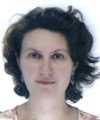 |
Sinda Lopez was born in Oxfordshire, UK of Spanish parents. She has lived in both in England and Spain and is bilingual in both languages. Shortly after graduating from Cambridge University with a degree in French and Spanish, she began her lexicographic career in 1987 working on the Oxford Spanish Dictionary. Over the years, she has been Managing Editor of Bilingual Dictionaries at Longman and Routledge and decided to go freelance in 1999, prior to the birth of her second child. As a freelance lexicographer she has worked on a wide range of both monolingual and bilingual projects for various publishers including Oxford University Press, Longman, Larousse, Bloomsbury and Macmillan. In the last five years, she has focused mainly on project management of dictionaries which have included several Larousse titles and recently the Macmillan Diccionario Pocket.
|
|||
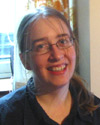 |
I first became interested in learner's dictionaries more than 10 years ago while teaching English in Lithuania. I became a lexicographer with Cambridge University Press in 1999 and since then I have been involved in several ELT publications including Cambridge Advanced Learner's Dictionary, Cambridge Learner's Dictionary, the CD-ROM versions of the Macmillan English Dictionary and Macmillan Essential Dictionary as well as the Macmillan Schools Dictionary website. I have contributed to several websites – writing articles, designing web pages as well as adapting and creating interactive activities and games. I work from my home in Perthshire and most of my spare time is taken up with my baby son Aonghas (Gaelic for 'Angus') and walking my parents' border collie, Misty.
|
|||
 |
Kerry has a first degree in computational linguistics and an MA in theoretical linguistics from the University of Manchester, specialising in syntactic theory. For several years she worked as a researcher at Manchester and Essex universities, where in connection with European projects on machine translation, she was involved in computational lexicography, co-ordinating research in computational descriptions of compounds and collocations, and presenting her work in various international academic contexts. In 1993 she joined Cambridge University Press as a lexicographer/editor and grammar consultant, and worked on a large number of Cambridge learner's dictionaries, including the English Pronouncing Dictionary, the Cambridge International Dictionary of Phrasal Verbs and the Cambridge Learner's Dictionary in print and CD-ROM versions. In June 2001 Kerry moved to York where she now works as a freelance editor/lexicographer and is involved in a range of dictionary and grammar projects. Among the publications she has contributed to are Advanced Grammar In Use (2nd Ed.) and the Cambridge Advanced Learner's Dictionary for Cambridge University Press, the Collins COBUILD Elementary Grammar (2nd Ed.), Macmillan Phrasal Verbs Plus and the Macmillan School Dictionary. As well as being the regular author of the MED website's 'Word of the Week' column, she regularly writes for MED Magazine and co-authors grammar reference material for onestopenglish. Most of her spare time is spent looking after her two young sons Tom and Sam, though she enjoys walking, swimming and any opportunity to travel.
|
|||
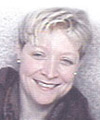 |
Kate is a senior lecturer in English translation studies at the School of Modern Languages and Translation Studies at the University of Tampere, Finland. She has published numerous articles on speech communication and oral history and has co-authored language text books. She has also contributed to the Dictionary of American Family Names published by Oxford University Press and is currently on the advisory board of the Spanish journal Historia, Antropología y Fuentes Orales. Before coming to Finland as a Fulbright Scholar in cross-cultural studies, Kate was a lecturer and teaching fellow at Columbia University in New York. She has studied Finnish at Columbia University and at the University of Helsinki. Even so, her most valuable language-learning experience was working on a Finnish cucumber farm. In her free-time Kate loves to cook and is an avid antique collector. While she is absolutely hopeless at recognising and gathering Finnish mushrooms, she has learned to fish with family and friends in the Finnish archipelago in her small wooden boat, ‘Salmon Ella’. Kate holds both British and American passports, but her not-so-secret dream is to become a Finnish citizen.
|
|||
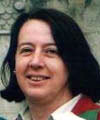 |
Like most people who write dictionaries for a living, I became a lexicographer by accident. After several years working in Italy and Scotland as an ELT teacher and course organiser, and as a translator and teacher of Italian, I was looking for a change. In 1990, a friend spotted a job ad for bilingual lexicographers at Longman. I applied and got the job, and discovered something I had never suspected – that dictionaries are written by people like me. After two years at Longman, I moved to COBUILD, where I worked on monolingual learner's dictionaries. Since leaving COBUILD in 1999 to work freelance, I have contributed to a variety of monolingual and bilingual learner's dictionaries, and for several years I wrote a weekly web article about English. When I'm not slaving over a hot dictionary entry, I like to spend my time gardening, and enjoying the company of my husband and two children. I also sing in a choir and go to yoga classes, though despite many years of trying I still can't manage the lotus position.
|
|||
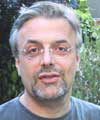 |
Martin Shovel is one of UK's leading freelance cartoon
illustrators – his online portfolio can be viewed at www.shovel.co.uk.
He is also a published author and an experienced teacher and workshop
leader. Alongside his writing, over the past 18 years Martin has built up a successful career as a cartoon illustrator, with a distinguished client list including Ogilvy & Mather, DMB & B, Arthur Andersen, McCann-Erickson, De La Rue, Lehman Brothers International and Oxford University Press. Prior to setting up CreativityWorks with Martha Leyton in 2001, Martin had run workshops on cartooning and creativity for a wide range of clients, including Nottingham University, the Office for Public Management (OPM), Brighton College of Technology, Lewes Tertiary College, Sussex Directors of Studies Association, Lewes Prison, West Sussex County Council, and Surrey County Council.
|
|||
| Meet the Editor | ||||
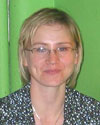 |
Kati
Sule
I come from Hungary. I studied English Language and Literature at the University of Szeged in south-east Hungary where I also completed an English Language Teaching degree. I taught English in Hungary and briefly in the Netherlands. I work as Commissioning Editor in the Macmillan Dictionaries editorial group and I am also one of the editors of the Macmillan English Dictionaries resource site. I am based in Amsterdam but frequently travel to the UK. I'm a keen but rather lazy runner. In my free time I enjoy squash, films, books and the company of our 13 year-old cat called Cica. |
|||
|
Cover photographs courtesy of Editor (language interference)
and Superstock (British and American Culture) |
||||
|
|
||||